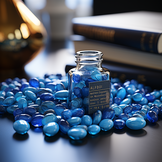Niacin dosage and effectiveness for treating erectile dysfunction.
- Understanding Niacin (Vitamin B3)
- The Role of Niacin in the Body and its Effects on Blood Flow
- Niacin and Erectile Function
- High Cholesterol and Erectile Dysfunction (ED)
- Study in the Journal of Sexual Medicine
- The Effectiveness of 1,500 mg of Niacin for Men with ED and High Cholesterol
- Side Effects of High Doses of Niacin
- Niacin's Role in Erections and Atherosclerosis
- The Need for Medical Consultation
- Niacin for Treating Mild ED
- Recommended Niacin Dosage for Treating ED
- The Time It Takes for Niacin to Improve Erectile Function
- Niacin Side Effects and Erectile Dysfunction

Understanding Niacin (Vitamin B3)
Niacin, also known as vitamin B3, is a critical nutrient required by the body. It plays an essential role in converting food into energy, supporting DNA repair, and managing stress response. It is one of the eight B-vitamins, water-soluble nutrients that are indispensable for the body's metabolic processes.
The Role of Niacin in the Body and its Effects on Blood Flow
Niacin's function extends beyond metabolism.
It affects blood flow by aiding in the production of certain hormones in the adrenal glands and in removing harmful chemicals from the liver. Niacin also relaxes arterial walls, thereby improving blood flow throughout the body, including the penis, which is vital for men's sexual health.
Niacin and Erectile Function
The improved blood flow to the penis due to niacin can potentially enhance erectile function. Niacin helps widen and relax the blood vessels, leading to increased blood flow. In men, this improved blood circulation may result in a better ability to maintain an erection, thereby potentially treating conditions like erectile dysfunction (ED).
High Cholesterol and Erectile Dysfunction (ED)
Cholesterol is a lipid that the body uses to build cells. However, high cholesterol can lead to atherosclerosis, a condition where fatty deposits accumulate in the arteries, restricting blood flow. This can impact several parts of the body, including the penis, thus leading to erectile dysfunction. Niacin's ability to improve blood flow can counteract the effects of high cholesterol on erectile function.
Study in the Journal of Sexual Medicine
A study published in the Journal of Sexual Medicine explored niacin's effects on men with ED and high cholesterol. In the study, 160 men with moderate to severe erectile dysfunction were given a daily dose of 1,500 mg of niacin for 12 weeks. The results showed significant improvement in their ability to maintain an erection compared to those who took a placebo.
The Effectiveness of 1,500 mg of Niacin for Men with ED and High Cholesterol
The aforementioned study showed that a daily dose of 1,500 mg of niacin significantly improved the sexual function of men with ED and high cholesterol. The study's participants reported enhanced ability to maintain an erection and overall improvement in their sexual performance. This provides preliminary evidence that niacin could be an effective treatment for ED in men with high cholesterol.
Side Effects of High Doses of Niacin
Although niacin can be beneficial, high doses can cause side effects. These can include skin flushing, dizziness, rapid heartbeat, itching, nausea, and diarrhea. In rare cases, high doses of niacin can cause liver problems, gout, and blurred vision. Therefore, it is essential to consult a doctor before starting a high-dose niacin regimen.
Niacin's Role in Erections and Atherosclerosis
Niacin plays a crucial role in facilitating erections by improving blood flow to the penis. Moreover, it helps to ease the effects of atherosclerosis by reducing the production of free radicals, which can damage the arteries. Thus, niacin can indirectly contribute to the treatment of ED by promoting healthier arteries and better blood flow.
The Need for Medical Consultation
Given the potential side effects, it's crucial to consult with a doctor before taking high doses of niacin. This is particularly important for men with pre-existing medical conditions or those on medication that may interact with niacin.
Niacin for Treating Mild ED
While the aforementioned study focused on men with moderate to severe ED, there's reason to believe that niacin could also be beneficial for those with mild ED. The increased blood flow promoted by niacin might be just what is needed to overcome mild performance issues, but more research is needed in this area.
Recommended Niacin Dosage for Treating ED
Though studies have used a daily dose of 1,500 mg of niacin to treat ED, the optimal dosage may vary based on individual needs and existing health conditions. Therefore, it is recommended to seek a healthcare provider's advice before starting a niacin regimen.
The Time It Takes for Niacin to Improve Erectile Function
The study mentioned earlier showed improvement in erectile function after 12 weeks of daily niacin intake. However, individual results may vary, and it's recommended to maintain regular consultation with a healthcare provider during treatment.
Niacin Side Effects and Erectile Dysfunction
As mentioned, while niacin has potential benefits for ED, high doses can have side effects. These include skin flushing, dizziness, and other potential health risks. Therefore, individuals should consider these factors and discuss them with a healthcare provider before using niacin for ED.
In conclusion, niacin shows potential for treating erectile dysfunction, particularly in men with high cholesterol. While further research is needed, existing studies suggest that a daily dose of 1,500 mg of niacin can improve erectile function. As with any treatment, potential side effects must be considered, and it's essential to consult with a healthcare provider before starting a niacin regimen.



